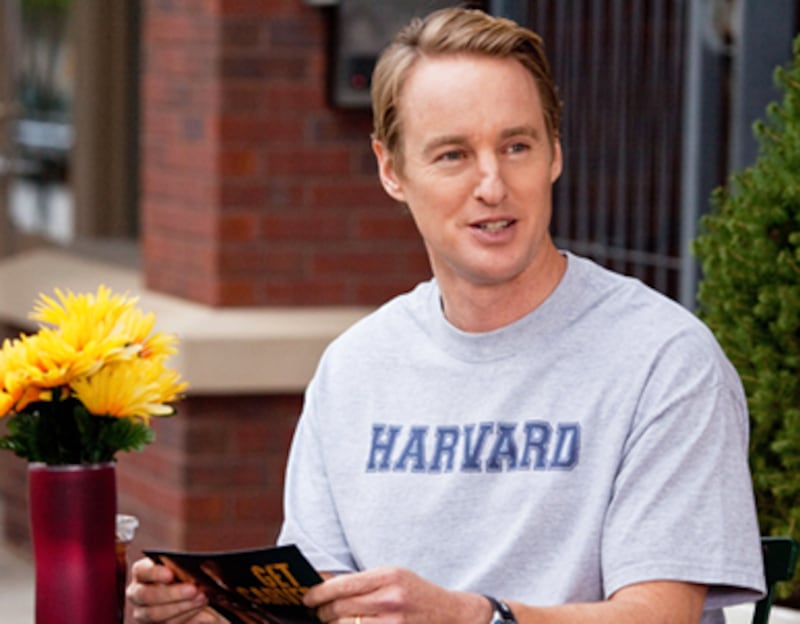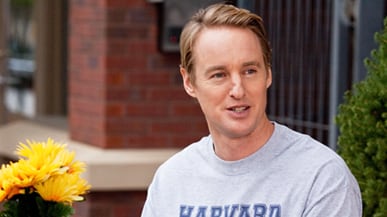With his crinkly eyed grin and shaggy mane of blond hair, an aw-shucks charisma that’s like catnip to grannies and glamazons alike, and an aura of American everyman-ness, Owen Wilson has cornered the market on a certain kind of movie role: the cool dude with heart. Call him the psychic love child of Jeff Spicoli and Jimmy Stewart.

But the circumstances surrounding what happened to Wilson on Aug. 26, 2007 paint a very different picture of the performer while also suggesting his true self remains shrouded in mystery. Police were famously called to the Wedding Crasher star’s Santa Monica home, responding to a 911 call by his younger brother, Luke. Owen was taken to a nearby hospital for treatment after reportedly having attempted to take his own life by slashing his wrists and taking “ an indeterminate number of pills."
Had the actor, as Us Weekly reported at the time, spiraled into depression on the heels of a tortured break-up with Kate Hudson and become hooked on cocaine and heroin? Or had Wilson fallen under the sway of notorious substance abuser Steve Coogan, as the British comic’s former girlfriend Courtney Love put forward that month?
ADVERTISEMENT
At the apogee of interest surrounding this out of nowhere revelation–that the A-list actor known as the Butterscotch Stallion even had a dark side when few people outside his inner circle had seen him in a bad mood–Wilson issued a plea to the fourth estate: “I respectfully ask the media to allow me to receive care and heal in private during this difficult time.”
Then, amid the insatiable demands of the 24-7 celebrity industrial complex, in which famous people are not only held accountable for every personal trespass, protocol requires them to be made into national spectacles, a funny thing happened. Wilson never publicly addressed the subject again.
“He’s a true artist,” Peter Farrelly said. “And artists have their ups and downs.”
In his raunchy new comedy Hall Pass, which arrives in theaters today, the actor portrays a guy who gets a “ week off from marriage,” ostensibly for some sexual R and R. But in the court of public opinion, it is Wilson who seems to have gotten the hall pass. He has never explained what happened to him that anguished Sunday in August, while his publicist maintains a strict we-don’t-comment-on-private-matters policy to those kinds of interview requests (and declined to make him available to The Daily Beast as well). Moreover, based on the most recent round of perfunctory, unrevealing interviews he’s done in support of the film–for which he received a reported $8 million payday, enough to land him at No. 26 on the Vanity Fair Hollywood’s Top 40 list of the town’s biggest earners—Wilson doesn’t seem likely to lay himself emotionally bare anytime soon either.
It’s a fascinating instance of a celebrity hiding in plain sight–and getting away with it—that stands virtually alone in Hollywood’s PR playbook. Especially when you contrast Wilson’s plight to that of Tom Cruise, who has never stopped explaining nor apologizing for the minor infraction of jumping on Oprah’s sofa.
While Wilson’s silence on the matter surrounding his suicide attempt has remained confoundingly complete for four years, it’s not as though enterprising reporters haven’t attempted to break through. In a 2008 dual interview with the actor and Jennifer Aniston for their canine rom-com Marley & Me, a USA Today interviewer tried to back into the subject of Wilson’s personal life en route to asking the suicide question.
“How challenging is it promoting a big, fun family film when the public seems so interested in your own lives?” the reporter queried, following up Aniston and Wilson’s none-too-personal answers with this soft-ball: “And what about your dogs? Do they help you get through the difficult times?”
Apparently seeing where things were headed, Wilson got up without a word and left the room. He returned a short while later to finish his questioning, having effectively foiled the interviewer’s intended privacy blitz.
Hall Pass co-writers and directors Peter and Bobby Farrelly have known Wilson since the 1996 release of his debut film Bottle Rocket; they’ve remained close with the actor over the years and Bobby Farrelly calls him “one of the great all time guys.”
Asked what may have prompted Wilson to try to take his own life, though, Peter Farrelly initially demurred, before offering a two-pronged explanation: that such behavior is out of character for the actor but it might be chalked up to his creative disposition.
“All I will say about that is, he’s a writer, an actor. He’s a true artist,” Farrelly said. “And artists have their ups and downs. Artists should be forgiven for those. You know, we’ve worked with a lot of actors where you do see both sides.”
He continued: “You see a funny guy and then you see him curled up in his trailer and can’t get out of bed. I’ve never seen that with Owen. He’s always up, always friendly and always happy. Easygoing. I’ve never seen him get mad. I can’t speak about [his suicide attempt] but to say it’s an anomaly.”
Dr. Paula Clayton, medical director of the American Foundation for Suicide Prevention, does not possess any specific insight into Wilson’s condition. But according to her data, Farrellys’ assessment is most likely on target.
“Given his age and gender, I would suspect it was not a cry for help. It was an attempt to relieve inner pain,” Clayton said. “Very few men make suicide attempts without something very serious going on in their lives. I would guess he had some significant problems combined with alcohol or drugs. There are many extremely successful people that have up and down personalities.”
To hear it from veteran film publicist Jeremy Walker, however, Wilson’s continuing don’t-ask-don’t-tell policy on the matter of his suicide attempt is perfectly in keeping with his career moves. By sticking to happy go-lucky, dramatically undemanding parts, the actor never opens himself up to probing questions.
“He’s never sat down and talked about it. Question is, do you have to anymore?” Walker said. “If all you do is romantic comedies, your life as a romantic person comes into play in interviews. If you make a movie like Ordinary People and you’re a movie star, your relationship with suicidal behavior is going to come up. It’s about how your personal agenda informs the commercial narrative. And for this particular project [ Hall Pass], Owen’s personal narrative does not jibe with the agenda of the movie.”
There is, of course, a time and a place for every boldfaced name to deliver a Devastating Public Admission About Some Heretofore Private Matter (DPAASHPM). Exhibit A: Janet Jackson maintained a veil of secrecy regarding her brother Michael Jackson after his 2009 death. That is, until she prepared to head out on her “Up Close and Personal” world tour and release her autobiography True You earlier this month, at which point Jackson took to the media circuit, providing no shortage of personal and family histories that had previously been off limits. And while Liam Neeson had never spoken about his feelings surrounding the accidental 2009 death of his wife Natasha Richardson, during promotional rounds for his new film Unknown, the Irish actor broke his silence to Esquire magazine (and perhaps not coincidentally, the movie went on to become a surprise hit last week).
According to Howard Bragman, head of the strategic media and public relations company Fifteen Minutes, Wilson’s suicide attempt has managed to vanish from public memory for a simple reason.
“I don’t think people want to go there,” Bragman said. “It’s a combination of Owen and his people handling it well, making the right career choices, and having a modicum of respect from the media.”
He added: “What’s the statute of limitations on personal issues in Hollywood?”
Chris Lee is a senior entertainment writer for Newsweek/The Daily Beast. He previously worked as an entertainment and culture reporter for the Los Angeles Times. His work has also appeared in Vibe, Premiere and Details magazines and has been plagiarized in The Sunday Tribune of Ireland and The Trinidad Guardian.






